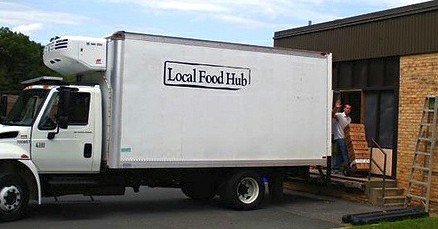A core component of any food hub is making sure that products can get from the farm to the table, a complex task involving perishable goods, cold storage, varying scales of supply and demand, and, of course, the occasional flat tire.
A number of food hubs have taken this challenge on utilizing diverse approaches, including a particularly impressive non-profit organization in Charlottesville, Virginia: Local Food Hub. Directed by the entrepreneurial Kate Collier and Marisa Vrooman, it is addressing three major issues in the local food system: distribution, supply and access.
Distribution begins with a warehouse and a refrigerated truck. However, the capital costs associated with building and maintain a warehouse, and obtaining a truck, can be daunting for any one producer or small-scale start-up. Remarkably, Local Food Hub was able to raise enough money from eager residents in Charlottesville and the surrounding farm communities to acquire the necessary infrastructure in 2009. To Collier and Vrooman, this was a telling sign from their neighbors that Local Food Hub’s services were in demand and important to their community.
Additionally, the hub also purchased $3 million in liability insurance, a cost that would be difficult for any individual small farm to shoulder alone. Since then, in just over 15 months of operation, they have purchased more than $340,000 worth of product from 50 farms within 100 miles of Charlottesville.
Local Food Hub has also diligently worked with their farmers to ensure a consistent, high-quality supply of product. They provide growers with important information about local demand, assisting farmers with their planting and pricing decisions. By assisting farmers with their business planning, they help ensure that farmers in their community can stay in business and can focus more on growing the best possible product.
Many of their planning workshops and trainings are held at their Maple Hill Educational Farm. The Hub also cultivates the next generation of farmers on their educational farm, providing hands-on experience to at-risk high school youth and year-long apprenticeships to aspiring young farmers. (Applications for next year’s apprentices here.)
As Manager of Outreach and Communications Emily Manley put it, “We were looking for an educational farm because we knew that supply would be a huge issue for us. A lot of our current, experienced farmers will be aging out and we didn’t see a population of younger farmers that were ready to take that responsibility over. So we needed a learning ground to start training farmers, identifying people who are aspiring farmers, and to hold educational workshops for established farmers. We also wanted a place to bring our community together around local food, to be more than just a distributor.”
Given already high demand, Local Food Hub has focused on improving access to local foods, making it easy for its 95 buyers in Charlottesville, such as Albemarle County Schools, the University of Virginia Health System, and various restaurants, to do business with one organization instead of multiple farms. They’ve also donated more than 50,000 pounds of healthy food to those in need by partnering with area food banks, soup kitchens and homeless shelters.
It’s clear that Local Food Hub is doing more than just aggregation and distribution. In less than two years it’s emerged as a model for fostering long-term sustainable development and community engagement through agriculture.




